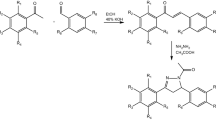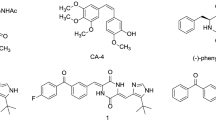Summary
Glochidiol has been shown to have potentially antiproliferative activity in vitro, however its anticancer mechanisms specifically against lung cancer remain unknown. This study aimed to investigate the anti-lung cancer effects of glochidiol in HCC-44 cells in vitro and in vivo. In the present study, glochidiol was found to have potent antiproliferative activity against lung cancer cell lines NCI-H2087, HOP-62, NCI-H520, HCC-44, HARA, EPLC-272H, NCI-H3122, COR-L105 and Calu-6 with IC50 values of 4.12 µM, 2.01 µM, 7.53 µM, 1.62 µM, 4.79 µM, 7.69 µM, 2.36 µM, 6.07 µM and 2.10 µM, respectively. In vivo, glochidiol was found to effectively inhibit lung cancer HCC-44 xenograft tumor growth in nude mice. Docking analysis found that glochidiol forms hydrogen bonds with residues of tubulin. Glochidiol was also found to inhibit tubulin polymerization in vitro with an IC50 value of 2.76 µM. Immunofluorescence staining and EBI competition assay suggest that glochidiol may interact with tubulin by targeting the colchicine binding site. Thus, glochidiol might be a novel colchicine binding site inhibitor with the potential to treat lung cancer.







Similar content being viewed by others
References
Ying X, Zhu J, Zhang Y (2019) Circular RNA circ-TSPAN4 promotes lung adenocarcinoma metastasis by upregulating ZEB1 via sponging miR-665. Mol Genet Genom Med 7:e991
Matsunashi A, Fujimoto D, Hosoya K, Irie K, Fukushima S, Tomii K (2020) Osimertinib in a patient with non-small cell lung cancer and renal failure undergoing hemodialysis: a case report. Invest New Drugs 38:1192–1195
Facchinetti F, Gnetti L, Balestra V, Silva M, Silini EM, Ventura L, Majori M, Bordi P, Tiseo M (2019) Sarcoid-like reaction mimicking disease progression in an ALK-positive lung cancer patient receiving lorlatinib. Invest New Drugs 37:360–363
Lin D-D, Shen Y, Qiao S, Liu W-W, Zheng L, Wang Y-N, Cui N, Wang Y-F, Zhao S, Shi J-H (2019) Upregulation of OTUD7B (Cezanne) Promotes Tumor Progression via AKT/VEGF Pathway in Lung Squamous Carcinoma and Adenocarcinoma. Front Oncol 9:862
Yerukala Sathipati S, Ho S-Y (2017) Identifying the miRNA signature associated with survival time in patients with lung adenocarcinoma using miRNA expression profiles. Sci Rep 7:7507
Song K, Zheng G, Zhao Y (2018) Liver kinase B1 suppresses growth of lung cancer cells through sonic hedgehog signaling pathway. Cell Biol Int 42:994–1005
Tun OJ, Salvador-Reyes AL, Velarde CM, Saito N, Suwanborirux K, Concepcion PG (2019) Synergistic cytotoxicity of renieramycin M and doxorubicin in MCF-7 breast cancer cells. Mar Drugs 17:536
Huang X-m, Yang Z-j, Xie Q, Zhang Z-k, Zhang H, Ma J-y (2019) Natural products for treating colorectal cancer: A mechanistic review. Biomed Pharmacother 117:109142
Cevatemre B, Erkısa M, Aztopal N, Karakas D, Alper P, Tsimplouli C, Sereti E, Dimas K, Armutak EII, Gurevin EG, Uvez A, Mori M, Berardozzi S, Ingallina C, D’Acquarica I, Botta B, Ozpolat B, Ulukaya E (2018) A promising natural product, pristimerin, results in cytotoxicity against breast cancer stem cells in vitro and xenografts in vivo through apoptosis and an incomplete autopaghy in breast cancer. Pharmacol Res 129:500–514
Zhang M, Tan S, Yu D, Zhao Z, Zhang B, Zhang P, Lv C, Zhou Q, Cao Z (2019) Triptonide inhibits lung cancer cell tumorigenicity by selectively attenuating the Shh-Gli1 signaling pathway. Toxicol Appl Pharm 365:1–8
Yousef M, Vlachogiannis IA, Tsiani E (2017) Effects of resveratrol against Lung Cancer: In vitro and in vivo studies. Nutrients 9:1231
Puapairoj P, Naengchomnong W, Kijjoa A, Pinto MM, Pedro M, Nascimento MSJ, Silva AMS, Herz W (2005) Cytotoxic activity of lupane-type triterpenes from Glochidion sphaerogynum and Glochidion eriocarpum Two of which induce apoptosis. Planta Med 71:208–213
Tanaka R, Kinouchi Y, Wada S-i, Tokuda H (2004) Potential anti-tumor promoting activity of lupane-type triterpenoids from the stem bark of Glochidion zeylanicum and Phyllanthus flexuosus. Planta Med 70:1234–1236
Guggilapu SD, Guntuku L, Reddy TS, Nagarsenkar A, Sigalapalli DK, Naidu VGM, Bhargava SK, Bathini NB (2017) Synthesis of thiazole linked indolyl-3-glyoxylamide derivatives as tubulin polymerization inhibitors. Eur J Med Chem 138:83–95
Ho S-T, Lin C-C, Tung Y-T, Wu J-H (2019) Molecular mechanisms underlying yatein-induced cell-cycle arrest and microtubule destabilization in human lung adenocarcinoma cells. Cancers 11:1384
Ghawanmeh AA, Chong KF, Sarkar SM, Bakar MA, Othaman R, Khalid RM (2018) Colchicine prodrugs and codrugs: Chemistry and bioactivities. Eur J Med Chem 144:229–242
Li L, Jiang S, Li X, Liu Y, Su J, Chen J (2018) Recent advances in trimethoxyphenyl (TMP) based tubulin inhibitors targeting the colchicine binding site. Eur J Med Chem 151:482–494
Zhang Q, Wang J, Zhang H, Liu D, Ming L, Liu L, Dong Y, Jian B, Cai D (2018) The anticancer efficacy of paclitaxel liposomes modified with low-toxicity hydrophobic cell-penetrating peptides in breast cancer: an in vitro and in vivo evaluation. RSC Adv 8:24084–24093
Liu C-M, Huang J-Y, Sheng L-X, Wen X-A, Cheng K-G (2019) Synthesis and antitumor activity of fluorouracil-oleanolic acid/ursolic acid/glycyrrhetinic acid conjugates. MedChemComm 10:1370–1378
Ansari M, Shokrzadeh M, Karima S, Rajaei S, Hashemi SM, Mirzaei H, Fallah M, Emami S (2019) Design, synthesis and biological evaluation of flexible and rigid analogs of 4H-1,2,4-triazoles bearing 3,4,5-trimethoxyphenyl moiety as new antiproliferative agents. Bioorg Chem 93:103300
Tian C, Chen X, Zhang Z, Wang X, Liu J (2019) Design and synthesis of (2-(phenylamino)thieno[3,2-d]pyrimidin-4-yl)(3,4,5-trimethoxyphenyl)methanone analogues as potent anti-tubulin polymerization agents. Eur J Med Chem 183:111679
Zhang Y-L, Yang R, Xia L-Y, Man R-J, Chu Y-C, Jiang A-Q, Wang Z-C, Zhu H-L (2019) Synthesis, anticancer activity and molecular docking studies on 1,2-diarylbenzimidazole analogues as anti-tubulin agents. Bioorg Chem 92:103219
Wei X, Zhang K, Qin H, Zhu J, Qin Q, Yu Y, Wang H (2018) GMDS knockdown impairs cell proliferation and survival in human lung adenocarcinoma. BMC Cancer 18:600
Kim C, Kim B (2018) Anti-cancer natural products and their bioactive compounds inducing ER stress-mediated apoptosis: A review. Nutrients 10:1021
Yuan S, Gopal JV, Ren S, Chen L, Liu L, Gao Z (2020) Anticancer fungal natural products: Mechanisms of action and biosynthesis. Eur J Med Chem 202:112502
Cao S-Y, Li Y, Meng X, Zhao C-N, Li S, Gan R-Y, Li H-B (2019) Dietary natural products and lung cancer: Effects and mechanisms of action. J Funct Foods 52:316–331
Romagnoli R, Kimatrai Salvador M, Schiaffino Ortega S, Baraldi PG, Oliva P, Baraldi S, Lopez-Cara LC, Brancale A, Ferla S, Hamel E, Balzarini J, Liekens S, Mattiuzzo E, Basso G, Viola G (2018) 2-Alkoxycarbonyl-3-arylamino-5-substituted thiophenes as a novel class of antimicrotubule agents: Design, synthesis, cell growth and tubulin polymerization inhibition. Eur J Med Chem 143:683–698
Banerjee S, Arnst KE, Wang Y, Kumar G, Deng S, Yang L, Li G-B, Yang J, White SW, Li W, Miller DD (2018) Heterocyclic-fused pyrimidines as novel tubulin polymerization inhibitors targeting the colchicine binding site: Structural basis and antitumor efficacy. J Med Chem 61:1704–1718
Verdier-Pinard P, Wang Z, Mohanakrishnan AK, Cushman M, Hamel E (2000) A steroid derivative with paclitaxel-like effects on tubulin polymerization. Mol Pharmacol 57:568
Jurášek M, Černohorská M, Řehulka J, Spiwok V, Sulimenko T, Dráberová E, Darmostuk M, Gurská S, Frydrych I, Buriánová R, Ruml T, Hajdúch M, Bartůněk P, Dráber P, Džubák P, Drašar PB, Sedlák D (2018) Estradiol dimer inhibits tubulin polymerization and microtubule dynamics. J Steroid Biochem 183:68–79
Romagnoli R, Baraldi PG, Cruz-Lopez O, Lopez Cara C, Carrion MD, Brancale A, Hamel E, Chen L, Bortolozzi R, Basso G, Viola G (2010) Synthesis and antitumor activity of 1,5-disubstituted 1,2,4-triazoles as cis-restricted combretastatin analogues. J Med Chem 53:4248–4258
Acknowledgements
Thanks for the support from First Affiliated Hospital of Zhengzhou University.
Funding
We thank the financial support from First Affiliated Hospital of Zhengzhou University.
Author information
Authors and Affiliations
Corresponding author
Ethics declarations
Conflict of interest
All authors have declared that they have no conflicts of interest to disclose. Hongjie Chen declares that he has no conflict of interest. Lijun Miao declares that she has no conflict of interest. Fengxiang Huang declares that she has no conflict of interest. Yali Yu declares that she has no conflict of interest. Qiang Peng declares that he has no conflict of interest. Ying Liu declares that she has no conflict of interest. Xixi Li declares that she has no conflict of interest. Hong Liu declares that she has no conflict of interest.
Ethical approval
This article does not contain any studies with human participants performed by any of the authors. All applicable international, national, and/or institutional guidelines for the care and use of animals were followed. Ethics Committee of Zhengzhou University approved this experiment (No. 2019-CHJ07). All procedures performed in studies involving animals were in accordance with the ethical standards of the ethics committee of Zhengzhou University (Zhengzhou, Henan Province, China).
Informed consent
Informed consent is not required in this type of study.
Additional information
Publisher’s Note
Springer Nature remains neutral with regard to jurisdictional claims in published maps and institutional affiliations.
Electronic supplementary material
ESM 1
(PDF 269 kb)
Rights and permissions
About this article
Cite this article
Chen, H., Miao, L., Huang, F. et al. Glochidiol, a natural triterpenoid, exerts its anti-cancer effects by targeting the colchicine binding site of tubulin. Invest New Drugs 39, 578–586 (2021). https://doi.org/10.1007/s10637-020-01013-1
Received:
Accepted:
Published:
Issue Date:
DOI: https://doi.org/10.1007/s10637-020-01013-1




